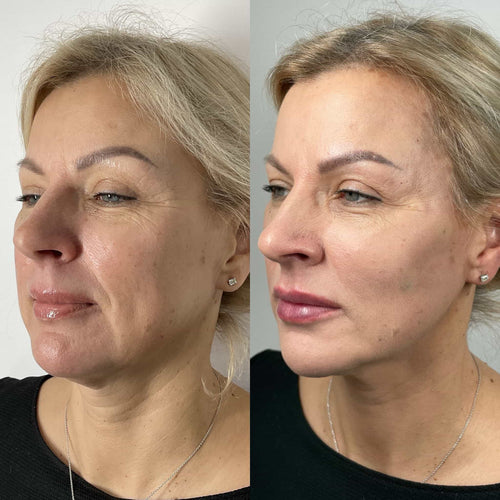Book a Dermal Filler Consultation at It’s Me and You Clinic with Dr. Laura Geige
Medical Conditions

Pregnancy and Breastfeeding
Radiesse is a dermal filler used to restore volume and reduce wrinkles. While generally safe for many adults, certain medical conditions and life stages may warrant caution or exclusion from treatment.
Individuals with active skin infections at the injection site should avoid Radiesse. Infections can complicate healing and increase the risk of complications. Additionally, pregnant and breastfeeding women should consult their physician before considering any cosmetic procedures, including Radiesse injections. The potential effects of Radiesse on a developing fetus or nursing infant are not well-established.
Individuals with bleeding disorders or those taking blood thinners may be at increased risk for bruising and hematoma formation after Radiesse injections. It’s important to discuss these medical histories openly with a physician to determine if Radiesse is suitable.
Autoimmune diseases can sometimes lead to an overactive immune response that could potentially react negatively to the filler material. Individuals with uncontrolled diabetes should also exercise caution, as they may be more susceptible to complications related to skin healing and infection.
Anyone with a history of allergic reactions to collagen or similar substances should avoid Radiesse.
It’s crucial for anyone considering Radiesse injections to have a thorough consultation with a qualified medical professional. This allows the physician to assess individual health conditions, medications, and potential risks to ensure safe and effective treatment.
Autoimmune Disorders
Medical conditions can significantly influence an individual’s suitability for certain cosmetic procedures, including Radiesse treatment. Autoimmune disorders present a particular concern as they involve the body’s immune system mistakenly attacking its own tissues.
Individuals with active autoimmune diseases may experience complications from Radiesse due to the potential for inflammation and immune response at the injection site. Some common autoimmune disorders that raise concerns include:
Systemic lupus erythematosus (lupus): This chronic inflammatory disease can cause widespread tissue damage, making individuals with active lupus more susceptible to complications from Radiesse.
Rheumatoid arthritis: This autoimmune disorder primarily affects the joints but can also involve other tissues. People with rheumatoid arthritis, especially those experiencing flares, may have increased risks associated with Radiesse injections.
Scleroderma:** This condition causes hardening and tightening of the skin and connective tissues. Radiesse’s interaction with these affected tissues could lead to unpredictable results or complications.
Psoriasis:** Although psoriasis primarily affects the skin, its autoimmune nature can make individuals more prone to inflammation and adverse reactions at injection sites.
It is crucial for individuals with any autoimmune disorder to consult with a qualified dermatologist or plastic surgeon before considering Radiesse treatment.
A thorough medical history review and assessment will help determine the potential risks and benefits specific to their condition.
In some cases, alternative treatments may be recommended to minimize the risk of complications.
Skin Conditions
Active Infections
Skin conditions can significantly impact a person’s candidacy for Radiesse treatment.
Active infections, whether localized or systemic, are a major contraindication for Radiesse injections.
Here’s why:
-
Compromised Immune System:
-
Increased Risk of Complications:
Active infections indicate a compromised immune system. Injecting Radiesse into infected tissue could worsen the infection, potentially leading to serious complications.
An active infection increases the risk of adverse reactions to Radiesse, such as pain, swelling, redness, and even abscess formation at the injection site.
Individuals with certain skin conditions may also be unsuitable for Radiesse treatment:
* **Rosacea:** Radiesse can potentially worsen rosacea flares.
* **Eczema or Psoriasis:** Active eczema or psoriasis in the treatment area can increase the risk of complications and hinder healing.
Reserve Your Dermal Filler Consultation with Dr. Laura Geige Now
It’s crucial for potential Radiesse patients to consult with a qualified dermatologist or plastic surgeon.
They will thoroughly assess the patient’s medical history, including any current skin conditions or active infections, to determine their suitability for treatment.
Recent Skin Procedures
Radiesse is a dermal filler composed of calcium hydroxylapatite microspheres suspended in a gel carrier. It’s commonly used to address facial wrinkles, folds, and volume loss, providing both immediate results and stimulating collagen production for longer-lasting effects.
While Radiesse can be an effective treatment for many individuals, certain people should exercise caution or avoid it altogether.
Individuals with active skin infections in the treatment area should avoid Radiesse. Infections can worsen and spread, posing a risk to health and compromising the treatment’s efficacy.
People with a history of severe allergic reactions to calcium-based products should consult their doctor carefully before considering Radiesse. There’s a potential for a severe reaction, although rare.
Pregnancy and breastfeeding are contraindications for Radiesse. The long-term effects of calcium hydroxylapatite on a developing fetus or nursing infant are unknown.
Individuals with certain bleeding disorders or those taking blood thinners should consult their doctor before getting Radiesse. The filler can increase the risk of bruising and bleeding, potentially leading to complications.
People with skin conditions like lupus, scleroderma, or other autoimmune diseases may need to avoid Radiesse. These conditions can affect the body’s immune response, potentially leading to adverse reactions to the filler.
As with any medical procedure, it is crucial for potential Radiesse recipients to have a thorough consultation with a qualified dermatologist or plastic surgeon. They can assess individual health history, skin type, and desired outcome to determine if Radiesse is appropriate and safe.
Sunburn or Sun Damage
Radiesse is a dermal filler made of calcium hydroxylapatite microspheres suspended in a gel carrier. It’s used to add volume and contour to areas like the cheeks, jawline, and hands.
While Radiesse can be a great option for many people, certain individuals should avoid or exercise caution when considering this treatment.
Here are some skin conditions that may preclude someone from receiving Radiesse:
**Active Skin Infections:** Radiesse is injected into the dermis, the middle layer of skin. Having an active infection in the injection area can increase the risk of complications, such as an abscess or spread of infection.
**Rosacea:** This inflammatory skin condition causes redness, visible blood vessels, and sometimes pimples on the face. Radiesse injections could worsen these symptoms.
<
Psoriasis: This autoimmune disease causes thick, scaly patches on the skin. Injecting Radiesse into affected areas might irritate the skin or trigger flare-ups.
**Eczema:** Similar to rosacea, eczema can cause inflammation and sensitivity in the skin. Radiesse injections could worsen these symptoms and lead to discomfort.
Other Considerations:
Even if you don’t have any of the above conditions, there are other factors that may influence your candidacy for Radiesse:
**Pregnancy and Breastfeeding:** The safety of Radiesse during pregnancy and breastfeeding hasn’t been fully established. It’s generally recommended to avoid cosmetic procedures during these times.
**Sunburn or Sun Damage:** Recent sunburn can increase the risk of complications from Radiesse injections, as the skin is already inflamed and sensitive. It’s best to wait until your sunburn has completely healed before considering treatment.
**Medications:** Certain medications, such as blood thinners, can increase the risk of bleeding during and after injections.
**Allergies:** Some individuals may be allergic to the ingredients in Radiesse. It’s important to discuss your medical history with a qualified provider before getting treatment.
Consultation is Key:
Ultimately, the decision of whether or not you’re a good candidate for Radiesse should be made in consultation with a qualified and experienced dermatologist or plastic surgeon. They can assess your individual skin condition, medical history, and goals to determine the best course of treatment.
Other Considerations
Allergic Reactions
Individuals with certain medical conditions or allergies should exercise caution when considering Radiesse treatment.
Firstly, it’s crucial to consult a healthcare professional if you have a history of severe allergic reactions to calcium-based products or any component of the Radiesse formulation.
Those with active skin infections at the injection site should also avoid Radiesse treatment until the infection is resolved.
Individuals with bleeding disorders or who are taking medications that affect blood clotting may be at increased risk of bruising or bleeding after treatment, and their suitability for Radiesse should be carefully assessed.
Pregnancy and breastfeeding are also considerations. While there is limited data on the safety of Radiesse during these periods, it’s generally advisable to avoid the treatment until after breastfeeding has concluded.
Patients with autoimmune diseases may experience an increased risk of complications or adverse reactions due to their compromised immune system.
Finally, it’s essential to disclose any history of facial filler complications to your healthcare provider, as this can inform their decision regarding the appropriateness of Radiesse treatment.
Medications
While Radiesse can be a beneficial treatment for many, there are certain individuals who should avoid it.
Here are some other considerations and medications that may impact candidacy for Radiesse injections:
- Medical Conditions:
- Pregnancy and Breastfeeding:
- Medications:**
- Blood thinners (e.g., warfarin, aspirin)
- Anti-inflammatory drugs (e.g., ibuprofen, naproxen)
-
Medical Conditions: Certain medical conditions can make Radiesse less suitable. These include active infections, autoimmune diseases, bleeding disorders, and uncontrolled diabetes.
-
Skin Type and Condition: Radiesse is generally well-tolerated by most skin types, but individuals with very sensitive or fragile skin might experience more irritation.
-
Sun Exposure: It’s crucial to protect treated areas from excessive sun exposure before and after treatment. UV rays can break down the hyaluronic acid in Radiesse, leading to premature loss of results.
-
Expectations: Realistic expectations are key. While Radiesse can provide noticeable volume enhancement, it’s not a permanent solution. Results typically last around 12-18 months and may require repeat treatments to maintain.
-
Cost and Accessibility: Radiesse treatment can be expensive, so it’s important to consider the overall cost, including multiple sessions if needed.
Individuals with active infections at the injection site or a history of severe allergic reactions to calcium hydroxylapatite should avoid Radiesse.
Conditions like lupus, scleroderma, or other autoimmune disorders may also make Radiesse unsuitable.
The safety of Radiesse during pregnancy and breastfeeding has not been established. It is generally recommended to avoid it during these times.
Certain medications can increase the risk of bruising or bleeding, which could be problematic after Radiesse injections. These include:
It is important to discuss your current medication list with your doctor before considering Radiesse.
Skin Conditions:
Individuals with active skin conditions, such as eczema or psoriasis, in the area where injections are planned may want to postpone treatment until their skin has cleared.
Other Considerations:**
If you have any concerns about your eligibility for Radiesse, it’s crucial to consult with a qualified medical professional. They can assess your individual health history and determine if this treatment is right for you.
Let me know if you have any other questions.
There are several other considerations when determining if someone is a good candidate for Radiesse, beyond the common contraindications (like allergies and pregnancy).
Here’s a breakdown:
Reserve a Dermal Filler Consultation with Dr. Laura Geige
It’s essential to have a thorough consultation with a qualified and experienced medical professional who specializes in injectables. They will assess your individual needs, medical history, and goals to determine if Radiesse is right for you.
Highland Spring Magazine Live Your Vows Otherwheres Magazine Market Day ME Josie Barrett Elizabeth Rohrbaugh
- Who Shouldn’t Get Tear Trough Filler? - November 19, 2025
- What Is Sexual Liberation And How It Influences The Modern Dating Scene - November 18, 2025
- Weed Infused Drinks That Belong At Your Next BBQ - November 15, 2025
